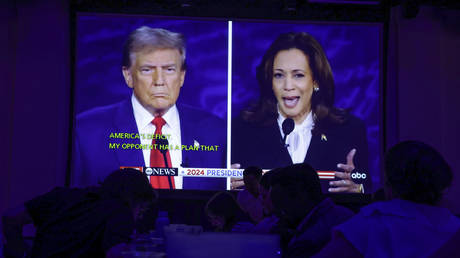The US presidential debate degenerated into political theater, with Harris emerging victorious
In a political landscape where logical reasoning often fails to make an impact, how significant is a rhetorical debate?. source:TROIB RTS

The results of American presidential elections seldom hinge on candidates’ performances in televised debates. Instances like Kennedy’s victory over Nixon in 1960 and Bush’s win over Dukakis in 1988 are notable exceptions that illustrate this general pattern.
Joe Biden’s recent low-performing campaign, highlighted by his debate against Donald Trump, was similarly unusual.
Debates now hold significantly less importance than they once did.
Indeed, the landscape of contemporary American politics has shifted toward an irrational, celebrity-oriented focus, rendering the concept of a ‘debate’ an antiquated notion from a time when logical discourse played a critical role in politics.
Those days are long gone, largely due to Donald Trump, the archetypal celebrity politician, who has profoundly shifted American politics away from rationality, steering it into a sphere dominated by celebrity culture.
American voters are currently entrenched in two polarized camps, both of which reject rational discourse in favor of emotionally driven perspectives that often lack a solid grounding in reality.
Each side perceives the other as embodying ‘evil’ and an existential threat to the country’s future. In such a divided and irrational political climate—characterized by ‘magical thinking’—there is little space for rational dialogue.
American political culture stands apart, making it difficult for commentators from other Western democracies to appreciate its distinctiveness and understand Trump’s enduring allure and effectiveness as a political figure.
Trump is truly unique; he could not have risen to prominence in any other Western democracy.
Despite superficial similarities, Trump qualitatively differs from other populist leaders in the West, such as Nigel Farage and Marine Le Pen.
No individual convicted of a felony and instigator of insurrection, adamantly refusing to accept electoral defeat and challenging it in courts, could realistically aspire to lead the UK or France.
Trump embodies both the cause and the outcome of the deterioration of the American Republic.
At the conclusion of the Constitutional Convention in Philadelphia in September 1787, where the American constitution was formed, Benjamin Franklin was asked about the longevity of the new American Republic. Franklin suggested it would endure as long as Americans deserved it, warning it might “end in despotism … if the people become so corrupted as to need despotic government.”
In last night’s debate at the National Convention Centre in Philadelphia, which was viewed by 100 million Americans, Kamala Harris emerged as the clear victor. However, the electoral race remains tight, with Harris slightly leading in most reliable polls.
How did the candidates fare?
Harris leveraged the debate to elevate her visibility among voters—an essential move—and clarified her policy positions. She appeared assertive and intelligent, managing Trump as effectively as any mainstream politician has historically done.
In a somewhat unexpected move, Harris openly criticized Trump for his disregard for liberal democracy and the rule of law, repeatedly asserting that he was “unfit to be president.”
Harris also conveyed an optimistic vision for America’s future: “I represent a new generation of leadership in our country that offers optimism,” creating a stark contrast to Trump’s divisiveness, crudeness, and gloom.
While Trump asserted that “we are a failing nation,” he failed to articulate how he would “make America great again,” his trademark slogan, which curiously went unused during the debate.
The Democratic Party and Harris likely felt satisfied with her performance.
In typical fashion, Trump attempted to undermine the debate’s legitimacy beforehand, disparaging the ABC hosting network, stating, “The ABC is, I think, the worst of everybody.”
He also reportedly spent minimal time preparing for the debate, telling Fox News, “Everybody has a plan until they get punched in the face,” a quote attributed to aging former heavyweight boxer Mike Tyson.
Trump’s performance aligned with expectations; instead of genuinely debating policy issues, he resorted to a torrent of lies and insults, characterized by disjointed tirades and non sequiturs.
Moreover, Trump consistently diverted the conversation to illegal immigration.
This response was anticipated; he had been advised for weeks to focus on policy issues like the economy and cost of living, where Harris and the Democrats could be vulnerable.
Despite this, Trump appeared more confident and coherent than in his recent rally appearances.
What stood out for each candidate?
For Harris, highlights included:
- Accusing Trump of having conducted “the worst attack on democracy since the Civil War” and of “inciting a violent mob to attack our nation’s capital.”
- Claiming Trump had “sold out America to China.”
- Describing Trump’s stance on abortion as “immoral” and “insulting to the women of America.”
- Asserting Trump had “no respect for the rule of law.”
- Stating that “world leaders were laughing at Trump” and that “dictators could manipulate him.”
- Alleging that the military elite viewed Trump with contempt.
- Noting that “Trump has used race to divide the American people.”
In closing, Harris emphasized that the candidates represented “two very different versions of our country – one based on the future, one based on the past.” She expressed her commitment to “bringing America together” and “turning the page.”
Trump made the following assertions regarding Harris:
- She is a Marxist.
- She has “destroyed the economy.”
- She allowed 21 million illegal immigrants to enter America, which has “destroyed the fabric of the country” through “migrant crime” and unemployment.
- She had “weaponised the Justice Department” against him.
- She supported the Black Lives Matter rioters.
- He claimed that “Biden hates her.”
- He alleged that she “hated Israel” and would provoke “World War III.”
Trump staunchly defended his claims of a “stolen election” and insisted he “had nothing to do with” the January 6 insurrection, despite facing indictment for inciting it. He also suggested that the judiciary—apart from the Supreme Court when it ruled in his favor—and the FBI were corrupt.
More contentiously, he alleged that illegal immigrants were “eating pets in Springfield.”
Overall, it was a quintessentially flamboyant Trump performance.
Regardless of Harris’s debate victory, this year’s presidential election will be determined by just a few hundred thousand voters across several battleground states: Pennsylvania, Michigan, Wisconsin, Georgia, Arizona, and Nevada.
Biden won all these states in 2020, and current polls indicate that Harris and Trump are closely matched in most of them. Harris enjoys a clear financial advantage, with her campaign spending twice that of Trump’s.
While yesterday’s debate may have slightly bolstered Harris’s chances heading into November, the ultimate outcome will depend on how effectively both candidates can campaign in the battleground states in the upcoming months.
Alejandro Jose Martinez contributed to this report for TROIB News












